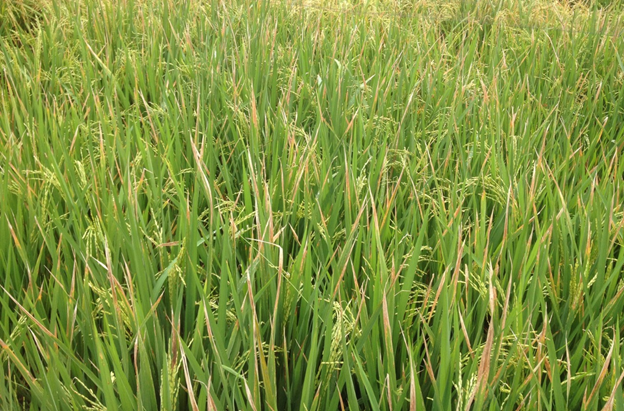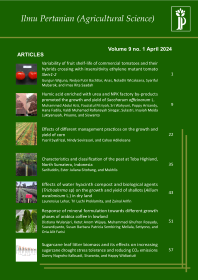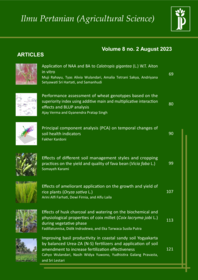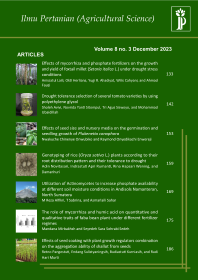
Effect of Salt Pretreatment on the Growth and Yield of Oryza sativa L. (cv. Dendang) under Saline Condition
Nindya Arini(1), Budiastuti Kurniasih(2*), Sriyanto Waluyo(3)
(1) Faculty of Agriculture Universitas Gadjah Mada, Yogyakarta
(2) Faculty of Agriculture Universitas Gadjah Mada, Yogyakarta
(3) Faculty of Agriculture Universitas Gadjah Mada, Yogyakarta
(*) Corresponding Author
Abstract
Productivity of rice as staple food of Indonesia needs to be improved. One of the efforts is by utilizing saline area for agricultural land. Salinity can be a serious problem leading to a decrease in crop productivity. Plant adaptation under salinity is an alternative to lower the risk, which can be improved by seedling pretreatment. The experiment was conducted in Baros, Kretek, Bantul, Yogyakarta. The objective of this research was to determine the growth and yield response of rice cv. Dendang to the salt pretreatment at early stage. The experiment was arranged in completely randomized design. The treatments used were salt pretreatment and without salt pretreatment. The salt pretreatment increased K+ concentration, total dry matter, plant height and number of tillers. However, it decreased proline and Na+ concentration of leaf. There was no significant difference on the yield and yield component. Increasing EC values up to 8.35 dSm-¹ at generative phase reduced the rice ability to cope this level of salinity despite the application of salt pretreatment. The benefit of salt pretreatment was exhibited on rice grown under EC value 5 dSm-¹.
Keywords
Full Text:
PDFReferences
Askari, N. H. 2013. The effects of seed priming techniques in improving germination and early seedling growth of Aeluropus macrostachys. Int. J. of Advanced Biological and Biomedical Research, 1: 86-95.
Bates, L.S., R.P. Waldren and L.D. Teare. 1973. Rapid determination of free proline for water-stress studies. J. Plant and soil, 39 : 205-207.
Binang, W.B., J.O. Shiyam and J.D. Ntia. 2012. Effect of seed priming method on agronomic performance and cost effectiveness of rainfed, dry-seeded NERICA rice. J. Research of Seed Science, 4 : 136-143.
Carillo, P., M.G. Annunziata, G. Pontecorvo, A. Fuggi and P. Woodrow. 2011. Salinity stress and salt tolerance, p 21-38. In: Shanker AAbiotic Stress in Plants-Mechanisms and Adaptations : InTech Press, Croatia.
Cayuela, E., M.T. Estañ, M. Parra, M. Caro and M.C. Bolarin. 2001. NaCl pre-treatment at the seedling stage enhances fruit yield of tomato plants irrigated with salt water. J. Plant and Soil, 2 : 231-238.
Chinnusamy, V, A. Jagendorf. and J.K. Zhu. 2005. Understanding and improving salt tolerance in plants. J. Crop Science, 45 : 437-448.
Cramer, G.R. 2002. Sodium-calcium interactions under salinity stress, p. 205-227. In : Läuchli A., Lüttge U. (eds) Salinity: Environment - Plants - Molecules. Springer, Dordrecht.
Gebreegziabher, B.G. and C.A. Qufa. 2017. Plant physiological stimulation by seeds salt priming in maize (Zea mays): Prospect for salt tolerance. African Journal of Biotechnology, 5 : 209 – 223.
Greenway, H. and R. Munns. 1980.Mechanisms of salt tolerance in nonhalophytes. Annual review of plant physiology, 1 : 149-190.
Gupta, B. and B. Huang. 2014. Mechanism of salinity tolerance in plants: physiological, biochemical, and molecular characterization. International journal of genomics,
Krishnasamy, V. and D.V. Seshu. 1989. Seed germination rate and associated characters in rice. J. Crop Science 4 : 904-908.
Liming, S., D.M. Orcutt and J.G. Foster. 1992. Influence of polyethylene glycol and aeration method during imbibition on germination and subsequent seedling growth of flatpea (Lathyrussylvestris). J. Seed science and technology, 3 : 349-357.
Maas, E.V. and G.J. Hoffman. 1977. Crop salt tolerance–current assessment. Journal of the irrigation and drainage division 2 : 115-134.
Munns, R., P.A. Wallace, N.L. Teakle and T.D. Colmer. 2010. Measuring Soluble Ion Concentrations (Na+, K+, Cl−) in Salt-Treated Plants, p : 371-282. In: Sunkar R. (eds) Plant Stress Tolerance. Methods in Molecular Biology (Methods and Protocols), Humana Press
Nawaz, J., M. Hussain, A. Jabbar, G.A. Nadeem, M. Sajid, M.U. Subtain and I. Shabbir. 2013. Seed priming a technique. International Journal of Agriculture and Crop Sciences, 20 : 1373.
Sivritepe, N., H.O. Sivritepe and A. Eris. 2003. The effects of NaCl priming on salt tolerance in melon seedlings grown under saline conditions. J. Scientia Horticulturae 3 : 229-237.
Sunghening, W. 2015. Characteristic physiology and yield mung bean (Vigna radiata, L.) at different shade level at Bugel coastal land Kulon Progo. (Thesis). Universitas Gadjah Mada.
Suriadikarta, D.A. and M.T Sutriadi, M.T. 2007. Jenis jenis lahan berpotensi untuk pengembangan pertanian di lahan rawa. Jurnal Litbang Pertanian 3 : 115-122.
Suwignyo, R.A., Renih & Mardiyanto. 2011. Pengaruh perlakuan salinitas awal rendah terhadap pertumbuhan dan toleransi salinitas tanaman jagung. Jurnal Agrivigor 10 (1).
Turan, M.A., A.H.A. Elkarim, N. Taban and S. Taban. 2009. Effect of salt stress on growth, stomatal resistance, proline and chlorophyll concentrations on maize plant. African Journal of Agricultural Research, 9 : 893-897.
Zeng, L. and M.C. Shannon. 2000. Salinity effects on seedling growth and yield components of rice. J. Crop Science. 40: 996–1003.
Article Metrics
Refbacks
- There are currently no refbacks.
Ilmu Pertanian (Agricultural Science) ISSN 0126-4214 (print), ISSN 2527-7162 (online) is published by Faculty of Agriculture Universitas Gadjah Mada collaboration with Perhimpunan Sarjana Pertanian Indonesia (PISPI) and licensed under a Creative Commons Attribution-ShareAlike 4.0 International License.













